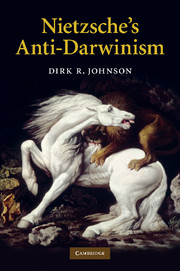Book contents
- Frontmatter
- Contents
- Acknowledgements
- Abbreviations
- Introduction
- Part I Early Darwinism to the “Anti-Darwin”
- Part II Nietzsche's Genealogy of Morals
- Chapter 4 Nietzsche's “nature”: or, whose playing field is it anyway?
- Chapter 5 The birth of morality out of the spirit of the “bad conscience”
- Chapter 6 Darwin's “science”: or, how to beat the shell game
- Conclusion
- Bibliography
- Index
Chapter 4 - Nietzsche's “nature”: or, whose playing field is it anyway?
Published online by Cambridge University Press: 17 November 2010
- Frontmatter
- Contents
- Acknowledgements
- Abbreviations
- Introduction
- Part I Early Darwinism to the “Anti-Darwin”
- Part II Nietzsche's Genealogy of Morals
- Chapter 4 Nietzsche's “nature”: or, whose playing field is it anyway?
- Chapter 5 The birth of morality out of the spirit of the “bad conscience”
- Chapter 6 Darwin's “science”: or, how to beat the shell game
- Conclusion
- Bibliography
- Index
Summary
GM I is steeped in controversy. Fraught with terms such as the “blond beast” and terminology such as Aryan versus Jews, Rome versus Judea, the essay contrasts the Jews, the original race of resentment, with the aristocratic warrior castes, the immoral “beasts of prey.” These associations have led some commentators to connect his philosophy with Nazism, and they continue to prevent an adequate assessment of his thinking. But such interpretations overlook a crucial fact: that the central argument of the first essay serves one larger purpose – and, indeed, it is the main purpose behind all three of the essays – and that is to question Darwin's theories of “moral” development and the origins of morality proposed by his many genealogical followers. The historical context of this work must guide our attention to its meanings. Rather than isolate and highlight controversial terms, one must re-embed them into the larger sustained argument of GM I as a whole. After all, Nietzsche makes his objective clearer in GM than in any other work: subtitled a “polemic,” it targets the “English psychologists” and their genealogical methodology in relation to the question of morality.
Enlightenment debates on “nature”
The entire argument of GM I subverts the unspoken Darwinian assumption that we can agree on a scientific definition for the “state of nature” and that this definition will apply to all organisms. Darwin's attempt to define “nature” according to the principles of “struggle,” “competition,” and “survival of the fittest” reveals this inherent bias.
- Type
- Chapter
- Information
- Nietzsche's Anti-Darwinism , pp. 111 - 139Publisher: Cambridge University PressPrint publication year: 2010

